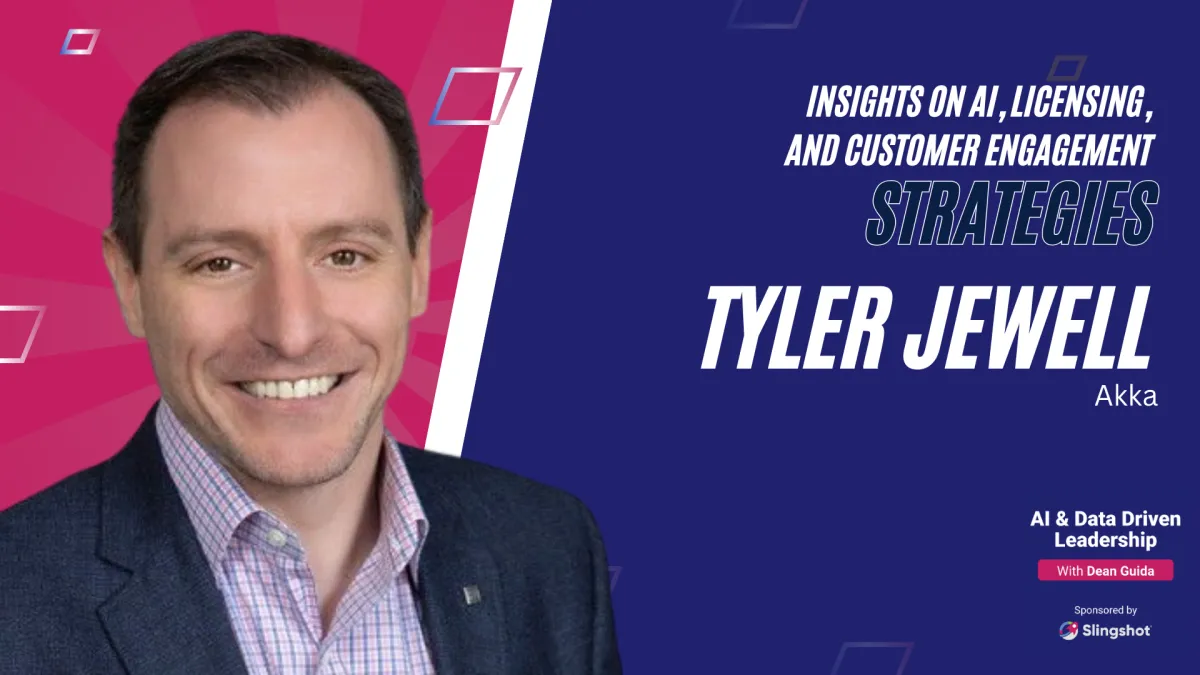Blog

13 - Insights on AI, Licensing, and Customer Engagement Strategies
Navigating the Evolution of Akka: Insights from CEO Tyler Jewell
In a recent episode of the podcast, host Dean welcomed Tyler Jewell, the CEO of Akka, to discuss his extensive background in the tech industry and the evolution of Akka as a company. Tyler, who has been involved in multiple tech ventures, shared insights into his journey, the challenges faced by Akka, and the strategies implemented to transform the company. This blog post delves into the key themes and actionable advice from the episode, providing a comprehensive guide for listeners and readers interested in developer platforms, AI integration, and business transformation.
Introduction to Tyler Jewell
Tyler Jewell has a rich history in the tech sector, having run four tech companies, all of which have successfully exited for investors and employees. His passion lies in developer platforms and developer experience, an area he has focused on for nearly 15 years. In addition to his role as CEO, Tyler is an active investor and publishes a widely read Substack on developer landscapes, providing valuable data and analysis on industry trends.
Overview of Akka
Akka, founded 15 years ago by Jonas Bonner in Stockholm, Sweden, began as an open-source project aimed at simplifying the development of concurrent systems on multi-core processors. The framework gained immense popularity due to its ability to handle complex multithreading and synchronization issues. Over the years, Akka has evolved into a comprehensive development framework for building distributed systems, capable of handling both stateless and stateful applications.
Tyler took over as CEO about a year and a half ago, after serving on the board. He has been instrumental in transforming Akka from a developer toolkit into a robust platform designed for building and running applications at scale, capable of processing tens of millions of transactions per second with ultra-low latency and high availability.
Customer Base and Use Cases
Akka has been downloaded over a billion times, with applications built using the framework impacting over 2 billion people daily. Major companies such as Starbucks, Apple, Walmart, Tesla, and Netflix utilize Akka for various applications, including data synchronization and server management. Tyler highlights the foundational role Akka plays in powering critical systems for these large enterprises.
Challenges Faced by Akka
Impact of COVID-19
Tyler candidly discusses the challenges Akka faced, particularly during the COVID-19 pandemic. The company experienced significant churn in developer accounts, and growth began to stagnate. The previous CEO was committed to a strategy that ultimately proved unsustainable, leading to a near bankruptcy event. Fortunately, supportive investors recognized the potential of Akka's technology and helped restructure the company.
Restructuring and Transformation
This restructuring involved significant layoffs, a change in business model, and a shift in product strategy. After nearly two years of hard work, Akka achieved its first positive EBITDA year, with revenues growing significantly. The company has also seen a 300% growth in its new platform, which is still in the process of becoming profitable.
Licensing Model Transformation
Open-Core to Business Source License (BSL)
One of the critical changes made during the restructuring was the transformation of Akka's licensing model. Initially, the company operated under an open-core model, which allowed for free use of its libraries under permissive licenses. However, as the community incorporated value-added features back into the open-source core, monetization became challenging.
In late 2022, Akka adopted a Business Source License (BSL), allowing free use for development but requiring a commercial license for production use. This change aimed to create a sustainable model that would ensure the company could maintain its software while still supporting the developer community.
Customer Engagement and Go-to-Market Strategy
Identifying and Engaging Customers
Tyler explains the challenges of identifying customers using Akka's libraries, as many developers download them anonymously from centralized repositories. To address this, Akka has implemented several strategies, including embedding communication within the software to inform users about licensing requirements and separating open-source versions from commercial ones.
Community Marketing and Awareness
The company also offers free commercial subscriptions to startups with revenues under $20 million in exchange for case studies, which helps generate community marketing and awareness. Tyler emphasizes the importance of these success stories in promoting Akka's value proposition.
Building Awareness and Community Engagement
Internal Messaging and Success Stories
To create awareness about the commercial version of Akka, the company focuses on internal messaging within the software, encouraging users to visit the subscription page for commercial use. Additionally, Tyler highlights the importance of community engagement and the positive impact of sharing success stories from startups that have built innovative solutions using Akka.
The Impact of AI on Akka's Product Roadmap
AI Integration and Transaction Demands
Tyler shares that Akka has already deployed AI systems for two major customers, one of which recently went public. He discusses the potential of AI as a transformative force in the industry, particularly in the context of transaction demands that companies will face in the future. Tyler refers to this shift as the "fifth wave of compute," where businesses will need to manage significantly higher transaction volumes due to the proliferation of AI agents.
AI Router and Model Management
Tyler introduces the concept of an "AI router," which would intelligently manage calls to various AI models based on their cost and performance characteristics. This approach aims to balance cost and accuracy, ensuring that companies can deploy a portfolio of models to meet their needs.
Improving AI Answer Quality
Tyler suggests that emerging frameworks will enable agents to evaluate and critique responses, iterating on their queries to achieve better results. This iterative process could involve comparing answers from multiple models, allowing for a more refined output.
Infinite Memory and Stateful Models
Tyler addresses the concept of "infinite memory" in AI systems, discussing the challenges of maintaining statefulness in a scalable manner. He explains that while stateful models may offer advantages in terms of context retention, they also introduce significant scalability issues. The conversation touches on the need for a robust architecture that can manage context and interactions without compromising performance.
Conclusion
In this episode, Tyler Jewell provides a compelling narrative about his journey as a CEO and the evolution of Akka. He shares valuable insights into the challenges faced by the company, the transformation of its business model, and the strategies implemented to engage customers and build awareness. As Akka continues to grow and adapt, Tyler's leadership and vision will undoubtedly play a crucial role in shaping the future of the company and its impact on the tech industry.
For those interested in learning more about Akka and connecting with Tyler Jewell, he encourages listeners to reach out via LinkedIn and explore Akka's platform, highlighting the ease of getting started with their services.
By diving deep into the nuances of each topic discussed in the podcast, this blog post aims to provide valuable and actionable insights for readers. Whether you're a developer, a tech enthusiast, or a business leader, the lessons from Tyler Jewell's journey and Akka's evolution offer a wealth of knowledge to guide your own endeavors.
Link to this episode: https://player.captivate.fm/episode/be4f1deb-1243-4e69-9d1c-50a961ab4660/
Listen and Subscribe to the AI & Data Driven Leadership Podcast Now:
Say "Hey, Siri / Alexa. Play AI & Data Driven Leadership Podcast"
About The Host
Tech entrepreneur and CEO Dean Guida knows there’s a limit to what you can build with grit alone.
At sixteen, Dean bought the first IBM PC and fell in love with writing software. He went on to receive a Bachelor of Science degree in operation research from the University of Miami. After graduating, he was a freelance developer and wrote many systems for IBM and on Wall Street. At twenty-three, he started Infragistics to build UX/UI tools for professional software developers.
Seemingly overnight, Dean had to go from early internet coder to business operator—a feat that forced him to learn some of business’s biggest lessons on the job. He immediately began navigating the nuances of scaling a company, hiring and growing teams, and becoming a leader, a manager, and a mentor.
Fast-forward thirty-five years, and Dean’s tech company now has operations in six countries. More than two million developers use Infragistics software, and its client roster boasts 100 percent of the S&P 500, including Fidelity, Morgan Stanley, Exxon, Intuit, and Bank of America.

Media














